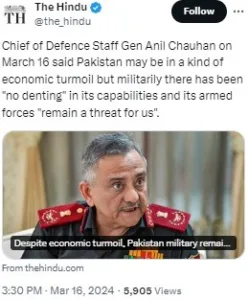by Muhammad Wasama Khalid 21 March 2024
The Pakistan Army serves as a critical pillar of the Pakistani state, playing a central role in national security. Operating tirelessly, its personnel safeguard Pakistan’s territorial integrity along both eastern and western borders. Their around-the-clock vigilance has established a reputation for formidable strength, even instilling fear in potential adversaries.
Along the eastern border with India, the Pakistan Army maintains a robust defensive posture to deter potential aggression and respond effectively to any provocation. The presence of a well-trained and well-equipped army along the Line of Control (LoC) and the Working Boundary underscores Pakistan’s commitment to defending its territorial integrity and maintaining peace and stability in the region.
In a recent address at the India Today Conclave 2024, General Anil Chauhan, India’s Chief of Defence Staff (CDS), emphasized the persistent threat posed by the Pakistani military despite Pakistan’s current economic struggles. He acknowledged the country’s financial hardship but asserted that the Pakistan Army’s operational strength remains largely intact.
Furthermore, General Chauhan identified the rise of China and its deepening strategic partnership with Pakistan as the most significant challenges confronting the Indian armed forces. This burgeoning Sino-Pakistani alliance necessitates a comprehensive reassessment of India’s national security posture.
A senior Indian Army general recently remarked upon the seemingly paradoxical relationship between India and Pakistan. He characterized their friendship, as described by their neighbors, as possessing both immense height (“as high as the Himalayas”) and profound depth (“as deep as the oceans”). Notably, both nations possess nuclear capabilities.
These comments come just days after India’s large-scale military exercise, “Bharat Shakti,” conducted in Pokhran, a town bordering Pakistan. The general’s statement can be interpreted as an acknowledgement of the Pakistan Army’s historical effectiveness in defending its territory. He suggests that past Pakistani military actions are etched in the memories of their adversaries, deterring them from future aggression.
The general’s acknowledgement of Pakistan’s military capabilities highlights a specific context. These traits, demonstrably effective defense and a deterrent effect, distinguish the Pakistani army from other regional forces.
In the aftermath of Operation Swift Retort conducted by Pakistan in February 2019, a demonstrably forceful response, India has exhibited a marked reluctance to engage in further airspace violations. These developments serve as a cautionary tale (or: a salient reminder) for the current Indian administration led by Prime Minister Modi. Any future act of aggression undertaken by India against Pakistan will likely be met with a robust and decisive counter-offensive.
Similarly, along the western border with Afghanistan, the Pakistan Army plays a critical role in countering cross-border terrorism, insurgent activities, and smuggling networks. Through comprehensive border security measures, intelligence operations, and counterterrorism efforts, the Pakistan Army strives to prevent militant infiltration and maintain control over volatile border regions. Additionally, the army’s engagement in border management initiatives, such as the construction of border fences and checkpoints, aims to enhance security cooperation with neighboring Afghanistan and mitigate security threats emanating from the porous border.
On a separate note, a tragic incident unfolded on Saturday in the town of Mir Ali, located within the Khyber Pakhtunkhwa province bordering Afghanistan. A suicide bomber detonated an explosives-laden truck near a military post, resulting in the deaths of seven soldiers. The Pakistani military swiftly responded, engaging the attackers in a shootout that culminated in the neutralization of all six assailants.
In response to this attack, Pakistani President Asif Ali Zardari expressed his condolences by attending the funerals of the fallen soldiers. He further issued a resolute statement, vowing to seek retribution for the killings, emphasizing that “the blood of our martyred soldiers will not be spilled in vain.”
Pakistani airstrikes targeted multiple suspected hideouts of the Pakistani Taliban inside neighboring Afghanistan early on Monday, killing at least eight people, two days after insurgents killed seven soldiers in a suicide bombing and coordinated attacks in a northwestern region, officials said.
According to a Pakistani security official and an intelligence official, the airstrikes were carried out in Khost and Paktika provinces bordering Pakistan. The officials provided no further details. They spoke on the condition of anonymity because they were not authorized to speak to the media.
In response to a recent surge in insurgent activity, Pakistan launched a series of targeted airstrikes against suspected hideouts of the Pakistani Taliban within neighboring Afghanistan on the morning of Monday, April 1st [insert year]. This military action, a direct response to a suicide bombing and coordinated attacks that claimed the lives of seven Pakistani soldiers two days prior, resulted in the reported deaths of at least eight individuals.
According to anonymous sources within the Pakistani security and intelligence apparatus, the airstrikes were concentrated within the Afghan provinces of Khost and Paktika, both of which share a border with Pakistan. However, citing limitations placed upon them by official communication protocols, these sources declined to provide any further details regarding the specific nature or scope of the operation.
The Pakistan Army’s strategic importance extends beyond national borders, significantly influencing regional dynamics and geopolitics. Its role as a key security provider in South Asia contributes to regional stability and balances power dynamics in the broader Indo-Pacific region. The army’s professional capabilities, operational readiness, and nuclear deterrence posture shape perceptions of security and influence strategic calculations among neighboring countries.
Furthermore, the Pakistan Army’s involvement in regional peacekeeping missions under the auspices of the United Nations reflects its commitment to promoting peace and stability beyond its borders. Contributions to peacekeeping efforts in conflict-ridden regions, such as Africa and the Middle East, enhance Pakistan’s reputation as a responsible global actor and foster diplomatic goodwill with international partners.

